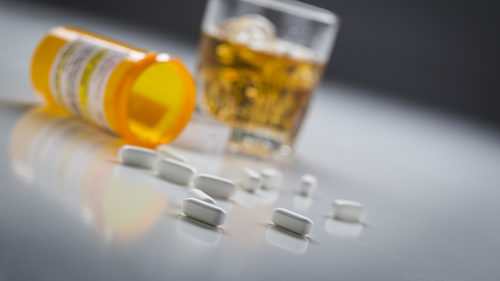Though alcohol was once prohibited in America, alcohol use has since become legal for consumption by individuals over the age of twenty-one, and further has become integral to American culture. According to the Centers for Disease Control and Prevention (CDC) “ethyl alcohol, or ethanol, is an intoxicating ingredient found in beer, wine, and liquor. Alcohol is produced by the fermentation of yeast, sugars, and starches.” The feelings elicited when an individual ingests alcohol occur as a result of the way the substance interacts with one’s neurotransmitters. The National Institute on Alcohol Abuse and Alcoholism (NIH) asserts, “Alcohol interferes with the brain’s communication pathways, and can affect the way the brain looks and works.”
Adderall is a prescription stimulant medication that is made up of two substances: dextroamphetamine and amphetamine. The United States Food and Drug Administration (FDA) approved Adderall for use in the treatment of attention-deficit hyperactivity disorder (ADHD) in 1996. Adderall is also classified as a Schedule II Controlled Substance by the United States Drug Enforcement Administration (DEA), which is defined as a drug “with a high potential for abuse, with use potentially leading to severe psychological or physical dependence.” When used exactly as directed, Adderall can effectively help individuals manage symptoms of ADHD. When Adderall is abused and/ or mixed alcohol it can be highly dangerous.
Risks
There is an erroneous notion that due to the fact that alcohol is a depressant and Adderall is a stimulant, mixing the two substances will cancel each other out. In reality, when alcohol and Adderall are both present in one’ system they compete with each other which can lead to serious complications.
- It is not uncommon for individuals that struggle with alcohol abuse to exhibit aggressive behavior and/ or experience reduced inhabitations. When alcohol is mixed with Adderall, these adverse side effects can become amplified.
- Mixing Adderall and alcohol could increase one’s risk of heart problems, including:
- Irregular heart rate
- Increased heart rate
- Elevated blood pressure
- Increased body temperature
- Due to the fact that when simultaneously present in one’s system, alcohol and Adderall compete with each other, Adderall can dull the symptoms associated with being drunk. Hence, an individual that mixes Adderall and alcohol may be unaware of the quantity of alcohol he or she consumes, which can in turn lead to alcohol poisoning.
Every individual is different and each will have a unique physiological response when ingesting drugs and/ or alcohol. It is essential to bear in mind that there are a variety of risks associated with taking any type of medication, whether prescribed or not. When an individual abuses drugs and/ or alcohol the risks increase exponentially.
For Information and Support
If you are concerned for yourself or a loved one in regards to substance abuse and/ or addiction we recommend reaching out for help as soon as possible. If left untreated, substance abuse can result in long lasting and potentially life-threatening consequences. Keep in mind: you are not alone! There is an entire network of professionals that are available to help and support you and your loved one throughout the recovery process. The earlier you seek support, the sooner your loved one can return to a happy, healthy, and fulfilling life.
Please do not hesitate to reach out with any questions regarding our specific program at Haven House Addiction Treatment and/ or general substance abuse and/ or addiction treatment related information. Our highly trained staff is readily available to discuss how we might best be able to help you and your loved one. We can be reached by phone at 424-258-6792. You are also welcome to contact anytime us via email at admissions@hhtxc.com.



